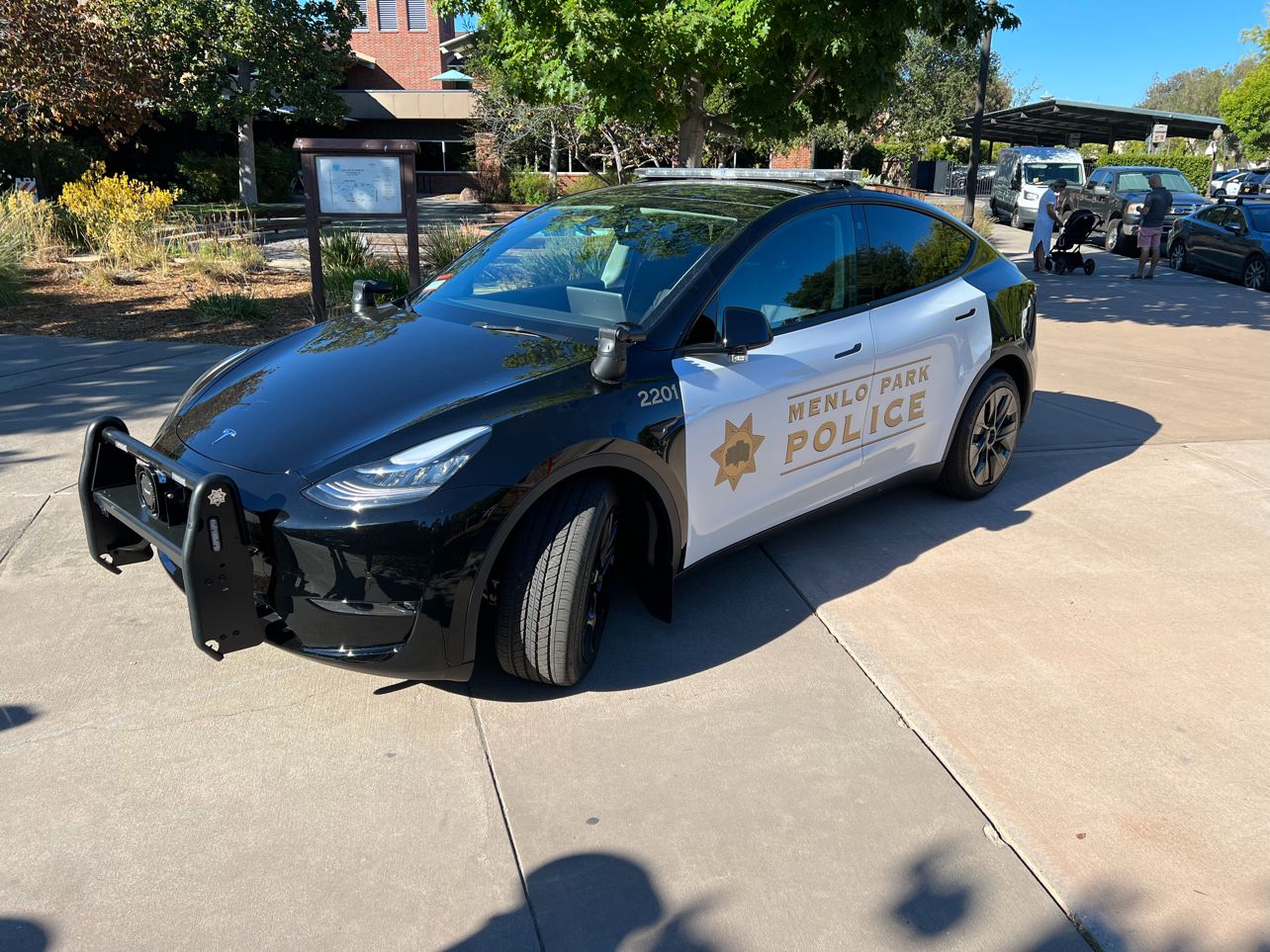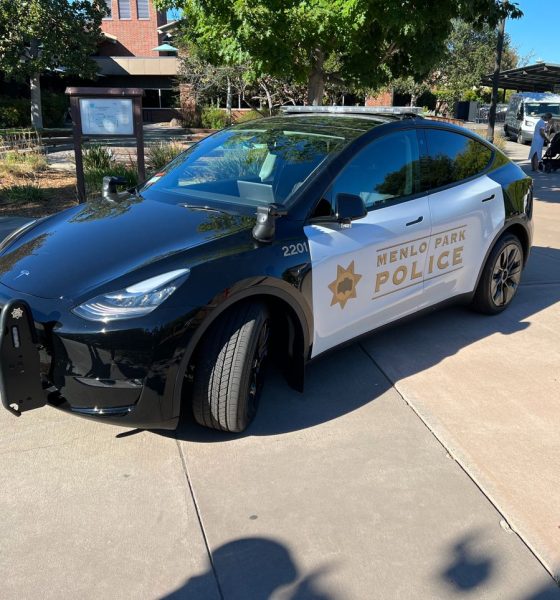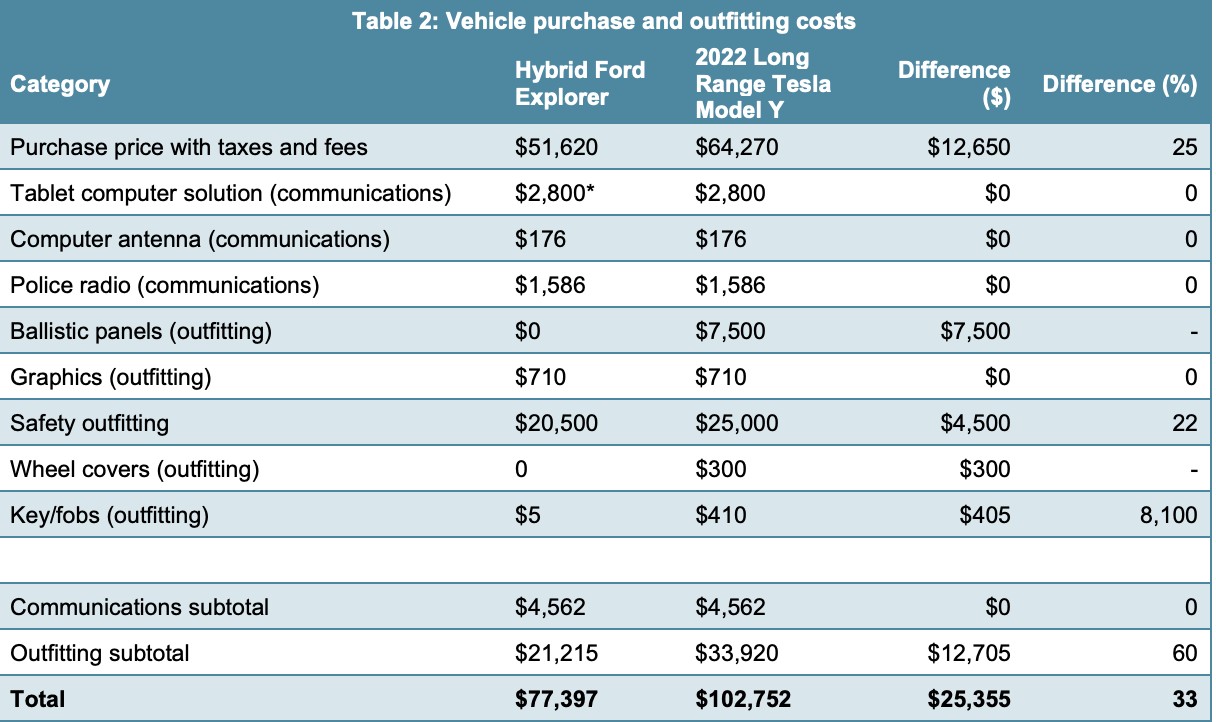

News
Tesla gets its first negative review from a police force standpoint
Tesla vehicles have been adopted by several police forces across the United States, and they have widely been met with positive reviews, mainly driven by cost savings and performance advantages.
However, one department has found the Tesla fleet to be less than ideal, even going as far as saying “(they) do not appear to the be the ‘patrol cars of the future.’”
In 2019, the Menlo Park, California City Council voted 3-2 to adopt a Sustainable Fleet Policy in 2020. The Model Y Long Range was chosen as the vehicle for the Menlo Park Police Department, beating out the Ford Mustang Mach-E and some other EVs.
Three units make up the EV portion of the Menlo Park Police Fleet.
Teslas need to be outfitted and modified for police use. Lights, sirens, seats, specialized seatbelts, communications equipment, a gun rack, window guards, and ballistic door panels are all equipped to make it a full-fledged law enforcement vehicle.
Tesla Model Y showcased at Menlo Park Police employee appreciation event
Outfitting a Tesla Model Y was roughly $12,700 more expensive than a Ford Explorer Hybrid, and the difference when also factoring in the initial cost of the vehicle came to $25,355, a 33 percent increase for the Tesla compared to the Ford.

Other police departments have canceled out the difference in initial cost after just a year of operation.
Officers also said the “small interior space” and “smart car” features, along with the low vehicle profile all made things more difficult.
Space Constraints
In terms of space constraints, after the vehicle is outfitted for patrol use, there is a “reduce amount of space for an officer in full patrol gear.” The report, released by the Menlo Park City Council, said:
“The width of duty belts and bulletproof vests do not fit well in the bucket seat and the height of the center console required larger officers to sit at an angle or with their sidearm pinned and inaccessible while in the vehicle. The equipment overhangs the passenger seat making it nearly unusable. This is not an immediate issue, as the current patrol operations do not deploy two officers in every vehicle, but would limit the ability to transport personnel or change operations in the future. In particular, the passenger seat space would not allow training officers to comfortably sit next to a trainee for a 12-hour shift, preventing field training for new officers. The rear seats provide very little room for anyone detained or transported in the back of the car.”
“Smart Car” Challenges
The Menlo Park PD listed Autopilot interference, lighting controls, and proximity locking, sleep mode, and self-closing doors as disadvantages:
“The following “smart” features of the Teslas created challenges for patrol operations:
-
- Autopilot interference: There is a delay when officers shift into drive; and on occasion the Teslas automatically stop when an officer attempts to pull off to the side of the road to approach vehicles or people.
- Lighting controls (tablet): Tesla does not allow direct access to the system; officers need to use a multistep touch screen process to follow standard practice to dim their lights upon approach at night.
- Proximity locking, sleep mode and self-closing doors: The car knows when the key is, or is not, present within an effective range. The cars will not lock if the key, or enabled smartphone, are near the vehicles and will conversely lock if the key or smartphone is away from the vehicle.”
According to Almanac News, Menlo Park’s local news, the City Council approved the purchase of a Chevrolet Blazer for a future Police vehicle. It appears the Department is just not set on the Tesla for police use.
“I am very proud that we tried the Teslas, and not everything works,” Betty Nash, a Council member, said. “I appreciate all the work that the police department did with working through all the bumps.”
I’d love to hear from you! If you have any comments, concerns, or questions, please email me at joey@teslarati.com. You can also reach me on Twitter @KlenderJoey, or if you have news tips, you can email us at tips@teslarati.com.

News
Tesla ships out update that brings massive change to two big features
“This change only updates the name of certain features and text in your vehicle,” the company wrote in Release Notes for the update, “and does not change the way your features behave.”

Tesla has shipped out an update for its vehicles that was caused specifically by a California lawsuit that threatened the company’s ability to sell cars because of how it named its driver assistance suite.
Tesla shipped out Software Update 2026.2.9 starting last week; we received it already, and it only brings a few minor changes, mostly related to how things are referenced.
“This change only updates the name of certain features and text in your vehicle,” the company wrote in Release Notes for the update, “and does not change the way your features behave.”
The following changes came to Tesla vehicles in the update:
- Navigate on Autopilot has now been renamed to Navigate on Autosteer
- FSD Computer has been renamed to AI Computer
Tesla faced a 30-day sales suspension in California after the state’s Department of Motor Vehicles stated the company had to come into compliance regarding the marketing of its automated driving features.
The agency confirmed on February 18 that it had taken a “corrective action” to resolve the issue. That corrective action was renaming certain parts of its ADAS.
Tesla discontinued its standalone Autopilot offering in January and ramped up the marketing of Full Self-Driving Supervised. Tesla had said on X that the issue with naming “was a ‘consumer protection’ order about the use of the term ‘Autopilot’ in a case where not one single customer came forward to say there’s a problem.”
This was a “consumer protection” order about the use of the term “Autopilot” in a case where not one single customer came forward to say there’s a problem.
Sales in California will continue uninterrupted.
— Tesla North America (@tesla_na) December 17, 2025
It is now compliant with the wishes of the California DMV, and we’re all dealing with it now.
This was the first primary dispute over the terminology of Full Self-Driving, but it has undergone some scrutiny at the federal level, as some government officials have claimed the suite has “deceptive” names. Previous Transportation Secretary Pete Buttigieg was one of those federal-level employees who had an issue with the names “Autopilot” and “Full Self-Driving.”
Tesla sued the California DMV over the ruling last week.
News
Tesla workers push back against Giga Berlin unionization
“IG Metall did not succeed in Giga Berlin‘s works council election earlier today. The union share was reduced from nearly 40% in 2024 to 31% in 2026! This is a clear message by the Giga Berlin team towards an independent co-determination! The list called Giga United, led by the current chairwoman, Michaela Schmitz, received the most votes with more than 40%! Good news for Giga Berlin!”

Tesla workers pushed back against unionization efforts at Gigafactory Berlin, and over the past few years, there has been a dramatic decrease in interest to unionize at the German plant.
Gigafactory Berlin Plant Manager André Thierig announced on Wednesday that IG Metall, the European union group, saw its share reduce from 40 to 31 percent in 2026 as employees eligible to vote on the issue. Instead, the Giga Berlin team, known as Giga United, received the most votes with more than 40 percent.
BREAKING! 🚨
IG Metall did not succeed in Giga Berlin‘s works council election earlier today. The union share was reduced from nearly 40% in 2024 to 31% in 2026!
This is a clear message by theGiga Berlin team towards an independent co-determination!
The list called Giga…
— André Thierig (@AndrThie) March 4, 2026
Thierig gave specific details in a post on X:
“IG Metall did not succeed in Giga Berlin‘s works council election earlier today. The union share was reduced from nearly 40% in 2024 to 31% in 2026! This is a clear message by the Giga Berlin team towards an independent co-determination! The list called Giga United, led by the current chairwoman, Michaela Schmitz, received the most votes with more than 40%! Good news for Giga Berlin!”
There were over 10,700 total employees who were eligible to vote, with 87 percent of them turning out to cast what they wanted. There were three key outcomes: Giga United, IG Metall, and other notable groups, with the most popular being the Polish Initiative.
The 37-seat council remains dominated by non-unionized representatives, preserving Giga Berlin as Germany’s only major auto plant without a collective bargaining agreement.
Thierig and Tesla framed the outcome as employee support for an “independent, flexible, and unbureaucratic” future, enabling acceleration on projects like potential expansions or new models. IG Metall expressed disappointment, accusing management of intimidation tactics and an “unfair” campaign.
The first election of this nature happened back in 2022. In 2024, IG Metall emerged as the largest single faction with 39.4 percent, but non-union lists coalesced for a majority.
But this year was different. There was some extra tension at Giga Berlin this year, as just two weeks ago, an IG Metall rep was accused by Tesla of secretly recording a council meeting. The group countersued for defamation.
Tesla Giga Berlin plant manager faces defamation probe after IG Metall union complaint
This result from the 2026 vote reinforced Tesla’s model of direct employee-management alignment over traditional German union structures, amid ongoing debates about working conditions. IG Metall views it as a setback but continues advocacy. Tesla sees it as validation of its approach in a competitive EV market.
This outcome may influence future labor dynamics at Giga Berlin, including any revival of expansion plans or product lines, which Musk has talked about recently.
News
SpaceX President Gwynne Shotwell details xAI power pledge at White House event
The commitment was announced during an event with United States President Donald Trump.

SpaceX President Gwynne Shotwell stated that xAI will develop 1.2 gigawatts of power at its Memphis-area AI supercomputer site as part of the White House’s new “Ratepayer Protection Pledge.”
The commitment was announced during an event with United States President Donald Trump.
During the White House event, Shotwell stated that xAI’s AI data center near Memphis would include a major energy installation designed to support the facility’s power needs.
“As you know, xAI builds huge supercomputers and data centers and we build them fast. Currently, we’re building one on the Tennessee-Mississippi state line. As part of today’s commitment, we will take extensive additional steps to continue to reduce the costs of electricity for our neighbors…
“xAI will therefore commit to develop 1.2 GW of power as our supercomputer’s primary power source. That will be for every additional data center as well. We will expand what is already the largest global Megapack power installation in the world,” Shotwell said.
She added that the system would provide significant backup power capacity.
“The installation will provide enough backup power to power the city of Memphis, and more than sufficient energy to power the town of Southaven, Mississippi where the data center resides. We will build new substations and invest in electrical infrastructure to provide stability to the area’s grid.”
Shotwell also noted that xAI will be supporting the area’s water supply as well.
“We haven’t talked about it yet, but this is actually quite important. We will build state-of-the-art water recycling plants that will protect approximately 4.7 billion gallons of water from the Memphis aquifer each year. And we will employ thousands of American workers from around the city of Memphis on both sides of the TN-MS border,” she noted.
The Ratepayer Protection Pledge was introduced as part of the federal government’s effort to address concerns about rising electricity costs tied to large AI data centers, as noted in an Insider report. Under the agreement, companies developing major AI infrastructure projects committed to covering their own power generation needs and avoiding additional costs for local ratepayers.








